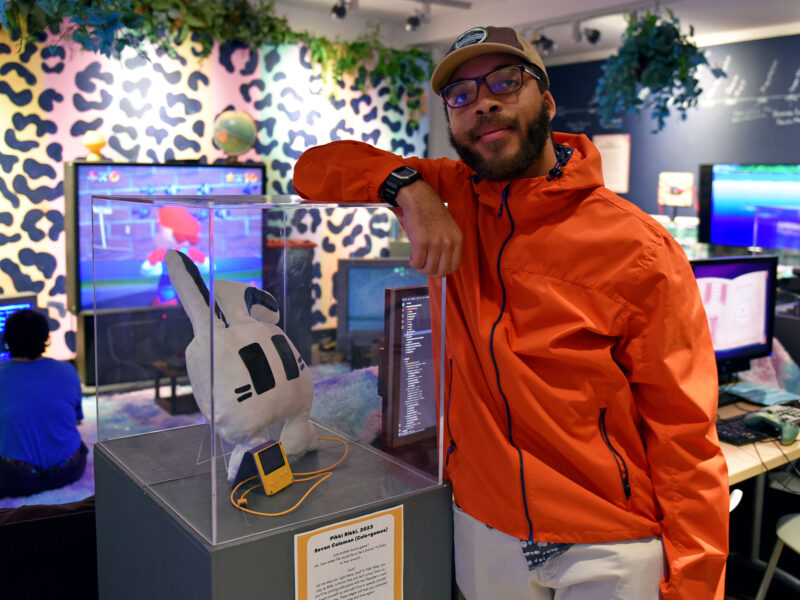Digital Forensics: The Other Side of the Cyber Coin

As our lives become more connected to the digital world, there’s an increasing need for experts who can tackle the complexities of cyber incidents. But there’s more to the digital field than just protecting against threats—sometimes, it’s about solving mysteries within them. Enter digital forensics, the crucial counterpart to cybersecurity.
In this Q&A, Digital Forensics Program Director and Professor Ali Hadi, an expert in the field, breaks down what digital forensics is, how it works alongside cybersecurity, and why it matters. From catching hackers to investigating stolen devices, digital forensics plays a role behind the scenes to keep our digital spaces secure and uncover what happens when things go wrong.
In general, what is digital forensics?
Digital forensics is like detective work in the digital world. It’s about analyzing digital devices such as computers, phones, and networks to find evidence connected to all kinds of cases, from cybercrime to real-world crimes where a device played a role. It combines tech skills and a solid understanding of law—digital forensics specialists follow strict methods to make sure the evidence they find can be trusted in court.
How does the average person interact with digital forensics?
You probably don’t realize it, but digital forensics has your back more often than you think. When you track a stolen phone or investigate messages related to harassment cases or when Netflix figures out who’s been messing with your account—there’s a bit of digital forensics magic going on. But, yeah, it tends to make the headlines when something big happens, like tracking down hackers or recovering stolen data. We swoop in when things go really wrong.
We often hear about digital forensics working hand-in-hand with cybersecurity—why is that?
Cybersecurity is like your bodyguard—keeping the bad guys out. Digital forensics is the detective you call when they’ve already broken in and made a mess. They work together when something goes wrong—like a data breach, hack, or malware attack. Cybersecurity teams protect systems from future attacks, while digital forensics uncovers how the attackers got in, what they did, and who might be responsible. Picture this: someone hacks into a system, cybersecurity kicks them out, and we come in to figure out who it was and how they did it. Together, they form a response team that’s essential for understanding and stopping threats.
How does digital forensics most differ from cybersecurity?
Cybersecurity is all about defense like a digital knight—protecting systems and data from attacks before they happen. Digital forensics, on the other hand, is more like Sherlock Holmes where he comes into play after an incident, focusing on investigating what happened, gathering evidence, and figuring out how an attacker got in. Cybersecurity is proactive, setting up barriers to keep threats out, while digital forensics is reactive, diving into the digital clues left behind to piece together the story of an attack or breach. One guards the door, the other follows the trail when it’s been opened. If you’re into solving mysteries rather than stopping them, digital forensics might be your jam.
What kinds of tasks, investigations, and general work might a digital forensics specialist do on a typical day?
A digital forensics specialist might spend their day analyzing devices for clues, recovering deleted files, tracing the origin of suspicious emails, or examining logs to piece together how a breach occurred. They might also testify in court, presenting digital evidence in cases ranging from fraud to cybercrime. Digital forensics is needed in many industries—finance to investigate fraud, healthcare to secure patient data, government to protect national security, and even entertainment to safeguard intellectual property. Wherever there’s digital information that could be evidence, digital forensics plays a role.
Where do you see the future of the industry going in the next five years? Anything you’re particularly concerned about or any opportunities you see for the future?
In the next five years, digital forensics will likely face both exciting advancements and new challenges. With the rise of AI and increasingly sophisticated cyberattacks, the field will need forensic specialists who not only know how to use cutting-edge tools but also have the curiosity and critical thinking skills to analyze every detail, spot patterns, and adapt to new challenges with a problem-solving mindset. The industry will be at the heart of securing our digital future, and that’s where its real potential lies. The big question is, will we be the Sherlock Holmes who stops these threats, or will the digital world be taken over by a Moriarty?
Looking for more information about Champlain College? Start here!
Fill out the form to receive helpful information!
Author
More Inside The View
Ideas
From the minds of our students, faculty, and alumni.
News
The latest from Champlain College.
People
Champlain is more than just a place; it's a community.
Places
On campus, in Burlington, and beyond.
Events
Check out our many campus events and get involved! Refine your search by using the filters or monthly view options.


